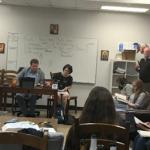 As Autumn comes, I am happy, Christmas is coming, but I am also reminded of absent friends: endings are all around. Houston is a city pointed deep into the twenty-first century, but I am a man of the twentieth century. As the years go by, my time is more past than future and that is a bit sad, but also a foundation. If you have lost someone, an Uncle Charlie, an Aunt Jean, a Father Michael . . .the fallen are greater each year.
As Autumn comes, I am happy, Christmas is coming, but I am also reminded of absent friends: endings are all around. Houston is a city pointed deep into the twenty-first century, but I am a man of the twentieth century. As the years go by, my time is more past than future and that is a bit sad, but also a foundation. If you have lost someone, an Uncle Charlie, an Aunt Jean, a Father Michael . . .the fallen are greater each year.
That sounds sad, but instead is, life is as it is. Fall is joyous for Christmas coming soon, sad for summer ending. Mourning, toasting those ahead of us, comes with the feasting. In ancient times, there was a custom of singing
“Deliberation,” I said, “about what has happened. One must accept the fall of the dice and settle one’s affairs accordingly—in whatever way argument declares would be best. One must not behave like children who have stumbled and who hold on to the hurt place and spend their time in crying out; rather one must always habituate the soul to turn as quickly as possible to curing and setting aright what has fallen and is sick, doing away with lament by medicine.”*
The young men are discussing threnody, the keening songs of mourning. Socrates suggests that these songs, at least in theater, are inappropriate. We should not be taught to mourn, but to have courage. We must, in a precursor to Stoic philosophy, keep calm and carry on. There is nothing we can do about what fate has determined. The shock of bad fortune might cause us to cry out, but training will teach us to quickly turn and set about fixing what has been wrong.
We ignore threnody for therapy.
Threnody, Plato notwithstanding, deals with pain that cannot be cured by therapy, because threnody does not exist to “fix” the problem, but acknowledge it and the pain caused. By all means, turn to therapy, medicine, and every device that can “fix” whatever is lost, but at times no fix is available. Autumn comes, people die, and there are losses that cannot be repaired. Threnody is a kind of repair in this case: mourning is appropriate to our souls.
And, after all, this passage runs the risk, one that is very real, of encouraging a false turning, of being “better” than we are. We experience the pain of autumn and pretend the pain is not there. We posture as if we do not need to scream and wail, but we do. The best poets, I think of Tennyson or Langston Hughes, memorialize real pain. Done properly this memorial will inspire others to first feel the pain and then act to do what can be done.
Threnody and therapy are together as part of the whole soul solution. Read carefully, in fact, the passage does not eliminate mourning, just the endless false grief that seeks attention and even (God help us!) pleasure in being “so sad.” Fakery in that direction is just as wrong-headed as false stoicism.
Threnody in the time of pain and then a turn toward a solution when there is one. When there is not one threnody as part of therapy and then a calm acknowledgement of the divine plan that can overcome fortune and bad choices by others over eternity. The Biblical texts show wisdom when God in the Flesh weeps and when He raises the dead. He mourns, but then gets to work.
That is probably what the text advises, but too cavalierly I think, at least for these times. Autumn is a time of loss, a time of promise: we clean up and prepare for winter, toast absent friends, and carry on as calmly as we can. Our whole soul can, after all, do more than one thing at once: weep, work, and wait for the Christmas that is coming.
————————————————-
*Plato, Republic. Book X, 604d. (Bloom Translation)












